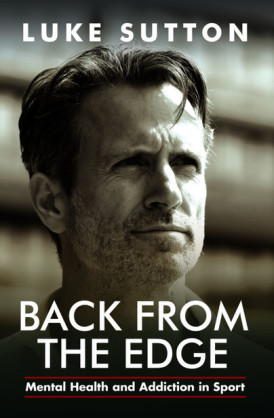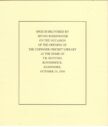Back From The Edge
Martin Chandler |Published: 2019
Pages: 110
Author: Sutton, Luke
Publisher: Pen and Sword
Rating: 3.5 stars

To the list of names that includes those of Graeme Thorpe, Marcus Trescothick, Jonathan Trott, Graeme Fowler, Michael Yardy and Robin Smith can now be added that of Luke Sutton. As mental health issues at last begin to be accepted as part of the human condition rather than a sign of weakness the publication of books like Back From The Edge help greatly to assist understanding of the sort of problems that, when I was growing up, were seldom openly talked about.
I suppose it makes sense that the sort of lives professional sportsmen live puts them at greater risk. Theirs is a short career, played out in front of partisan crowds and with constant pressure to perform, but has it not always been so? As I reflect on reading Back From The Edge I can’t help but wonder how different the 1946 autobiography of Walter Hammond might have been had he felt able to share his innermost thoughts with his readers, and what may have been learned if the likes of Harold Larwood, Bill Voce and Douglas Jardine had written autobiographies, and there must be many more examples.
But for now it is back to Luke Sutton, a man of whom I have two abiding memories, and both from the same day, 29th July 2010. I spent that day in Southampton, at the Rose Bowl. It was the first County Championship match I had been to for far too long. Lancashire had a struggle after Glen Chapple won the toss and chose to bat and without a fighting century from Shivnarine Chanderpaul it might have been a very bad day. Sutton only scored 29, but they were important runs and he showed a refreshing degree of application as he helped Chanderpaul add 77 for the sixth wicket.
And the second memorable moment? That came when I got home and my then wife decided to show an interest in where I had been and the events of the day. I showed her a few images of the Lancashire team, in which she did a good job of feigning a degree of enthusiasm until we got to Sutton, who she immediately adjudged the best looking man she had ever seen. I was instantly transported back more than a quarter of a century to my student days and an occasion when my then girlfriend issued a similar edict in respect of Graham Dilley – my understanding of women has never been great, but I will grudgingly accept that on both occasions I could see their point, even if, in mock horror, I accused both of being ‘shallow’.
Sutton first came to Lancashire in 2006 to replace the newly retired Warren Hegg. It never occurred to me that he was seeking to do anything more than advance his career by moving from Division 2 to Division 1. I didn’t realise that a year so before his life had been turned upside down by the death of his then girlfriend in a road accident, and after he returned to Derbyshire in 2011 and retired at the end of that summer I assumed that anno domini had simply caught up with him, and missed the news items that would have informed me that a battle with depression and alcohol were the reasons for his leaving the game.
There is not much cricket in Back From The Edge. There are no examinations of technique, descriptions of past matches or tales of dressing room banter. The bare bones of how Sutton’s career unfolded are one of the pegs on which his story is hung, but the book concentrates on the frightening scale of his alcohol problems and how, having come perilously close to completely falling apart, he finally managed to face up to his demons.
Luke Sutton’s story does not make for easy reading, and there will doubtless be pangs of discomfort for some who read it but ultimately the book contains much that is positive and underneath it all Sutton must be a decent bloke. The huge amount of help and inspiration that he received from those at The Priory could I suppose be looked on as ‘all in a days work’ for the staff there but plenty of others, including Glen Chapple, Mark Chilton and Jimmy Anderson, went well beyond the call of duty in their unstinting display of support and loyalty.






Leave a comment